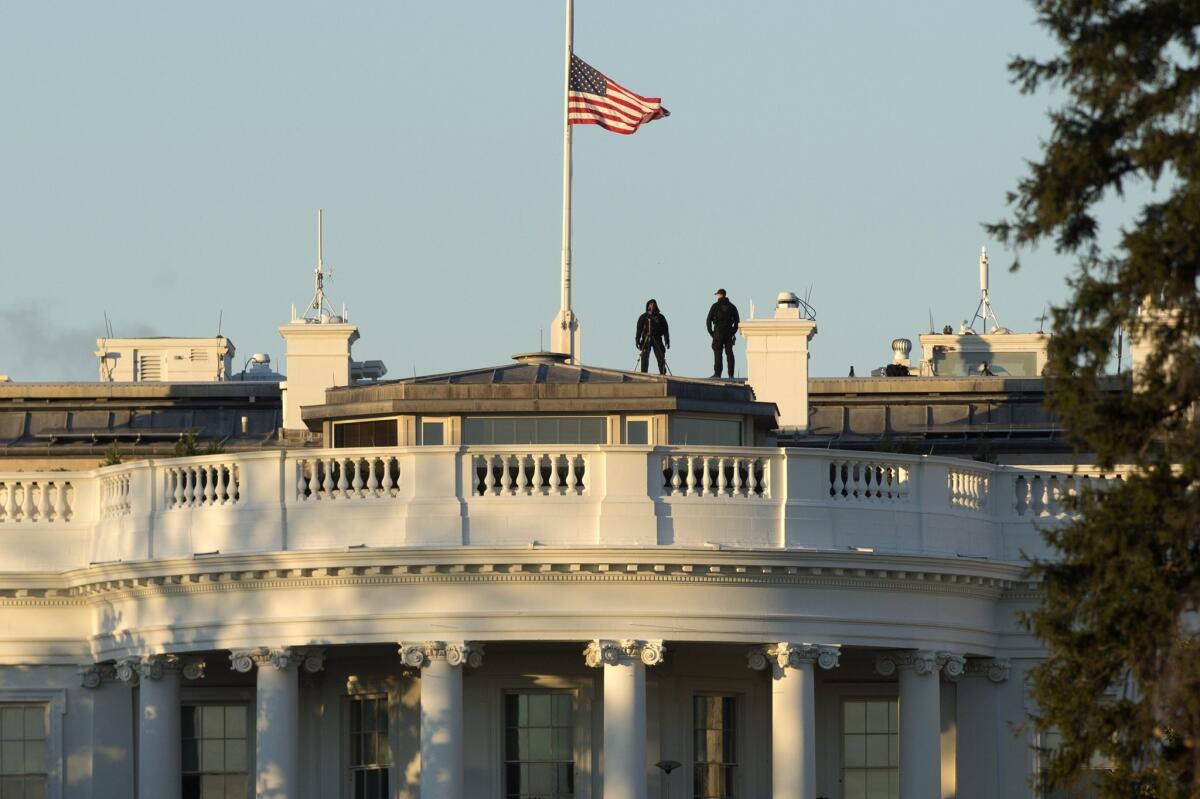Editorial: In the wake of the San Bernardino attack, fear shouldn’t guide America’s response

Members of the US Secret Service stand atop the White House, where the US national flag flies at half staff to honor the victims of the San Bernardino mass shooting on December 3.
- Share via
It now appears, as some had predicted from the start, that the husband and wife who carried out the brutal massacre in San Bernardino were motivated at least in part by Islamic extremism. According to the FBI, Tashfeen Malik — who, with her husband, Syed Rizwan Farook, killed 14 people and injured 21 more at an office holiday party on Wednesday — had pledged her allegiance to Islamic State on Facebook. There’s no indication so far that she or her husband were directed to launch the attack by the group. But given the pledge — and the assault weapons, pipe bombs and other explosives the couple was stockpiling, as well as the contacts discovered between Farook and terrorist groups — the evidence strongly supports the assumption that the two were self-radicalized independent operators inspired to action by rhetoric, terror and violence abroad.
It is entirely reasonable at a time like this to reconsider the policies that make us safe and to consider any steps to minimize the likelihood of further bloodshed.
If so, the war has come home. Not for the first time, of course. Before this, there were September 11 and Fort Hood, the Tsarnaev brothers in Boston and plenty of other attempts to bring the battles of the Middle East and the Islamic world across the Atlantic. But the fight against Islamic State — a group with a particularly warped interpretation of Islam that, in addition to capturing territory in Syria and Iraq, took credit for last month’s attacks in Paris — may now have appeared at our doorstep. Can anyone imagine that this will be the last such attack in the name of that group? That there won’t be copycat killers or other self-appointed Islamic militants seeking glory? Law enforcement officials have long warned that Islamic State embraces what New York Police Commissioner William Bratton called a “diffuse, lone wolf model, which encourages unaffiliated independent operators to do whatever damage they can with whatever is at hand.”
FULL COVERAGE: San Bernardino shooting | Shooting updates
That’s frightening, of course. But how should the United States respond? There will be all sorts of calls to action. Some have already said the U.S. should not let any Syrian refugees into the country (even though neither Farook nor Malik were refugees or Syrian). Some will demand greater domestic surveillance and more policing of mosques. Some may urge sterner action against Islamic State in Syria and Iraq — no-fly-zones, more airstrikes and additional U.S. boots on the ground. Pressure may rise to curtail domestic liberties in the name of security. With a presidential race heating up, grandstanding candidates will weigh in with all sorts of notions.
It is entirely reasonable at a time like this to reconsider the policies that make us safe and to consider any steps to minimize the likelihood of further bloodshed. But it is also essential to proceed carefully and rationally and not to succumb to the hysteria that sometimes accompanies national emergencies. A nation that detained its Japanese citizens after Pearl Harbor, and numerous Muslim citizens after the World Trade Center attacks on 9/11, should remember the shame it felt in the aftermath of those misguided, racist actions. A nation that only this year felt compelled to end the bulk collection of Americans’ phone records after the program was revealed by Edward Snowden should be careful not to reverse course recklessly in a futile attempt to know everything, everywhere. A nation that went to war in Iraq in part based on an assertion that the regime there had cooperated with Al Qaeda should be a bit chastened as it considers its global strategy. In short, we should forge our response through prudence and the wisdom gained from experience, not fear.
Follow the Opinion section on Twitter @latimesopinion and Facebook.
MORE FROM OPINION
San Bernardino massacre aftermath: A culture of fear?
Terrorism? Angry worker? Whichever, guns were central to the carnage
San Bernardino shooting just opened up a can of worms far bigger than gun control
More to Read
A cure for the common opinion
Get thought-provoking perspectives with our weekly newsletter.
You may occasionally receive promotional content from the Los Angeles Times.









